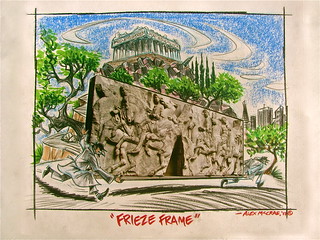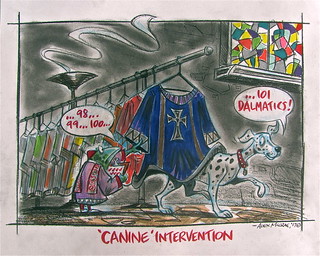|
Home
|
AWADmail Issue 774A Weekly Compendium of Feedback on the Words in A.Word.A.Day and Tidbits about Words and LanguageSponsor’s message: Do you love your mother? Does your mother love words? Then do the math. We’ll help: we’d like to invite this week’s Email of the Week winner, Anna Bucciarelli (see below), as well as anyone who loves their mother and grammar to visit our old’s cool “Make Mom Smile” collection of ludic gifts and gear. SHOP NOW.
From: Anu Garg (words at wordsmith.org)
Torching the Modern-Day Library of Alexandria
100 Days of Gibberish -- Trump Has Weaponised Nonsense
Icelanders Seek to Keep Their Language Alive and Out of “the Latin Bin”
From: Joel Mabus (joel.mabus pobox.com) I wonder if it is just coincidence that sybaritic rhymes with syphilitic?
Joel Mabus, Kalamazoo, Michigan
From: Andrew Pressburger (andpress sympatico.ca) The first time I encountered this word was in my high school days in my native Hungary, studying a poem “To the Hungarians” by Daniel Berzsenyi (1776-1836), a poet of the Hungarian Enlightenment.
What are Hungarians now?! Sybaritic wrecks -- they’ve ripped their splendid native insignia off while, from their homeland’s ravaged bulwarks, building a palace as lair of leisure -- He was the first to successfully introduce classical metres and themes in Hungarian poetry at a time when his fellow country squires preferred to speak a kind of kitchen Latin, if only to distinguish themselves from their serfs. He lived far from any town and was for many years unconnected with any literary circle. His activity as a poet was discovered by chance, and he became known through the efforts of Ferenc Kazinczy, a leading advocate of Hungarian enlightenment that eventually culminated in the Revolution of 1848 and the resulting War of Independence.
Andrew Pressburger, Toronto, Canada
From: Alexander Nix (revajnix yahoo.co.uk)
A THOUGHT FOR TODAY History is all explained by geography. -Robert Penn Warren, novelist and poet (24 Apr 1905-1989) Your thought for the day is excellently and humorously illustrated by Tim Marshall in his book Prisoners of Geography: Ten Maps That Tell You Everything You Need To Know About Global Politics.
Alexander Nix, Cambridge, UK
From: Anna Bucciarelli (anna sbmgarden.com) Subject: sardine I am reminded of my days travelling to work in the heart of New York City from Little Italy in the Bronx, truly sardined into subway cars. Unless you’ve been there, you can’t know the true meaning of being packed in, bodies so close, no need to hold on to anything as the train swayed. Nasty business some days, won’t even go into that. Leave it that I learned quite a lot about the seedy side of certain humans who took advantage of a very young girl with their roving hands, just from those subway rides.
Anna Bucciarelli, Chelmsford, Massachusetts
From: SarahRose Werner (swerner nbnet.nb.ca) I have fond memories of playing sardines as a child. It’s a kind of reverse hide-and-seek. The person who’s It hides, and everyone else looks for them. The difference is that as each person discovers It’s hiding place, rather than declaring the discovery they quietly join It inside. Soon almost all of the players are crammed into the hiding place like, well, sardines. The last person to discover the hiding place is It for the next turn. The game requires some strategy. If you discover the hiding place while there are other players around, you’re wise to pretend you haven’t noticed and try to divert the other players to a different location. (“Hey, did anyone check underneath Mom’s car?”) But if your diversion is too obvious or takes too long, it may backfire.
SarahRose Werner, Saint John, Canada
From: Stefan Bucek (skbucek comcast.net) The iconic arches that lined the roof of the old Yankee Stadium were known as the frieze. When the stadium was renovated in the ’70s, the frieze was reproduced only on the outfield wall, but when the new stadium was built across the street just before 2010, the frieze was restored to its rightful place on the roof that surrounds the field. I had a conversation a few years back with a sportswriter here in California, and when I used the word “frieze” in respect to Yankee Stadium, it was a sign to him that I was a genuine Yankees fan!
Stefan A.D. Bucek, San Jose, California
From: Kaan Kiziltan (kaan kiziltan.com) This week’s toponym on the map is not right. As correctly mentioned in Thursday’s AWAD message, Phrygia is in Asia Minor, with Gordium, the capital city of Phrygia, being very close to Turkey’s capital city, Ankara.
Kaan Kiziltan, Istanbul, Turkey
Thanks for taking the time to send the correction.
We have updated the map now.
-Anu Garg
From: Mark Plants (elmarko tcsn.net) I first encountered this word in Dorothy Parker’s poem, The Little Old Lady in Lavender Silk, in which the title character reflects on her “misspent” youth:
And I learned how to kiss and be merry -- an Education left better unsung. My neglect of the waters Pierian Was a scandal, when Grandma was young. I had to look up “Pierian” at the time. Seeing it in today’s post was like meeting an old friend!
Mark Plants, Atascadero, California
From: Christopher Lumpkin (calmichigan gmail.com) I think it can be safely said that pierian applies to all the arts and science of the Muses. I would argue that it does not single poetry out and make a distinction of poetry as more pierian than the others.
Christopher Alden, Philadelphia, Pennsylvania
From: Alex McCrae (ajmccrae277 gmail.com) STOP THE PRESSES... Greeks lose their marbles! To this very day a major issue of contention in the world of classical antiquities rightful ownership remains the British government’s purchase and subsequent removal of what are familiarly known as “The Elgin Marbles” many decades ago, long prominently displayed at The British Museum in London. The “Marbles” in question represented a huge trove of Golden Age of Athens (circa 450 BCE) exquisitely carved marble figurative sculptures, many removed from the Parthenon (Temple of Athena) atop the Acropolis, including scores of free-standing sculptural works, plus a 92-panel high-relief white marble horizontal frieze depicting legendary battles between the Lapiths and the Centaurs. In 1996, after six years at Warner Bros. TV Animation, I was lured away by a persuasive art director at Disney TV Animation Studios with the offer of a much larger paycheck. The initial series on which I’d be designing key backgrounds was a TV spin-off of the classic Disney feature film, “101 Dalmatians”. So in this little cartoon scenario, I’ve wedded the word “dalmatic” with one of those lovable black-spotted pooches who manages to get in the last word.
Alex McCrae, Van Nuys, California
From: Anu Garg (words at wordsmith.org) The text in the right box is an anagram of the text in the left.
From: Anu Garg (words at wordsmith.org)
There are those with estates sybaritic,
My granny was once sybaritic
It’s easy to be a quick critic,
To a word lover, marks diacritic
A priestly man should be a seeker,
When he’s up in the rectory attic,
The airfare and the fees we pay,
There was no one who loved a Marine
About that enigmatic word “frieze”,
The Parthenon had a fine frieze,
The sort of a place that I’d seek
The poet’s a master, pierian
If a foreign professor is queryin’
From: Phil Graham (pgraham1946 cox.net) Oh, brother! For his birthday, I gave my sybaritic-ulous present.
On the issue of vestments, high- and low-church officials are dalmatically opposed. We students protested our cramped college dorm room sardine resigned. Michelangelo yelled from the scaffolding, “I’m about to frieze up here!”
That’s quite a dessert trip ‘round lakes you’re on,
Phil Graham, Tulsa, Oklahoma
A THOUGHT FOR TODAY:
President, n. The leading figure in a small group of men of whom -- and of
whom only -- it is positively known that immense numbers of their
countrymen did not want any of them for president. -Ambrose Bierce, author
and editor (1842-1914)
|
|
Awards | Stats | Links | Privacy Policy
Contribute | Advertise
© 1994-2025 Wordsmith

